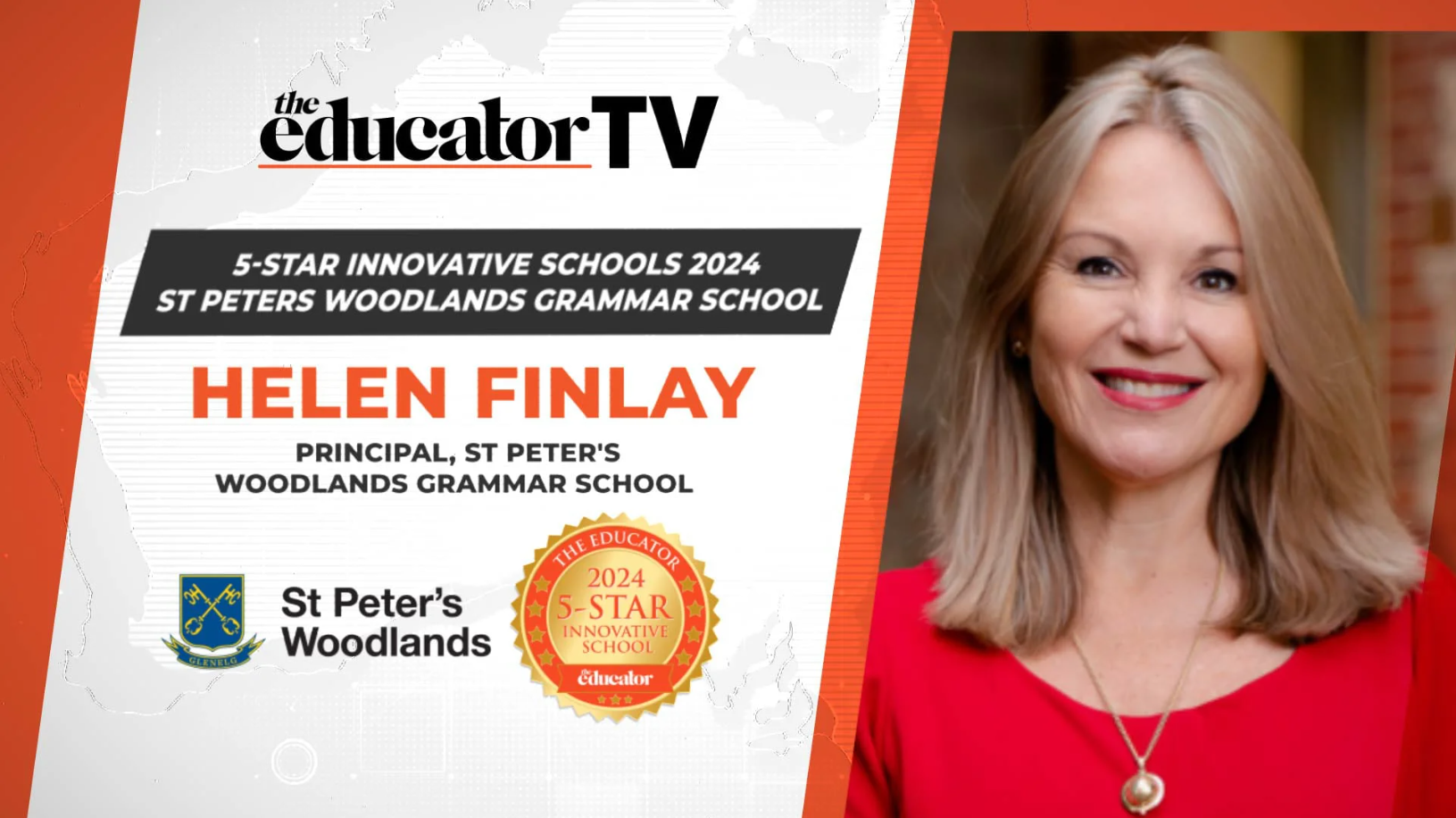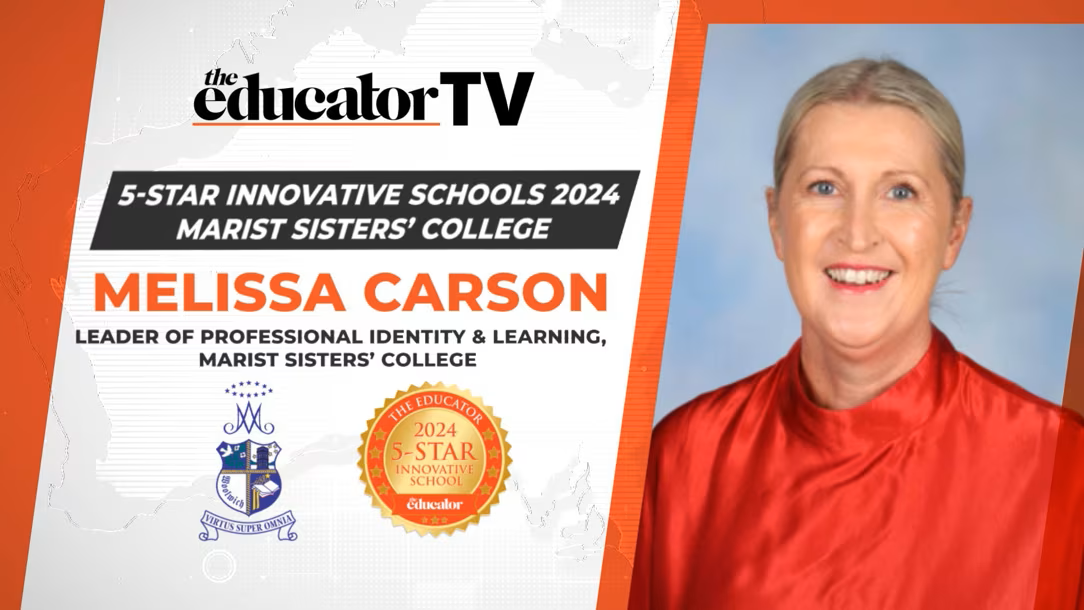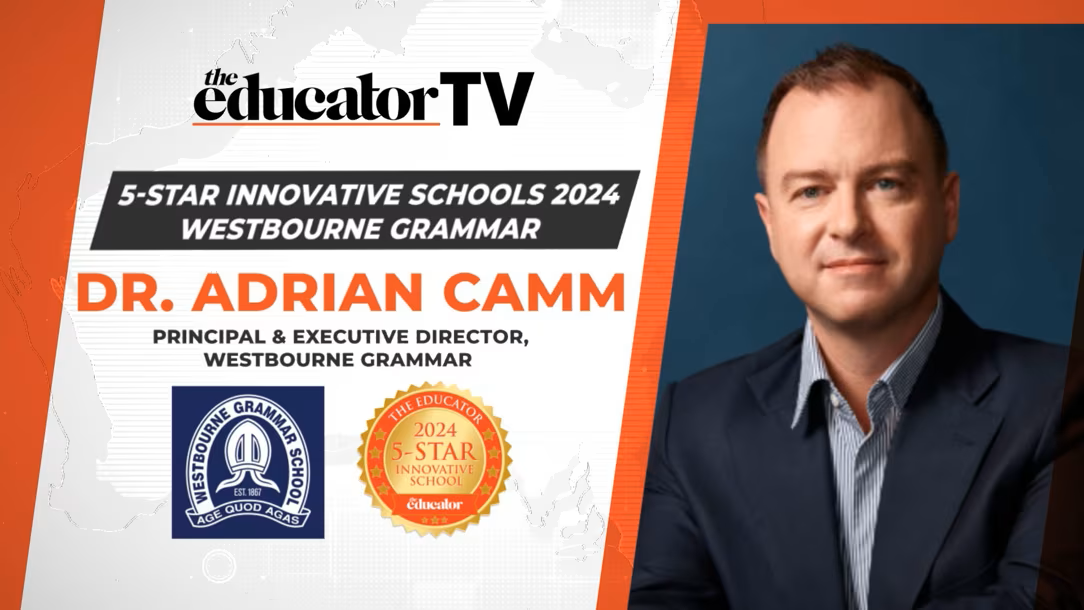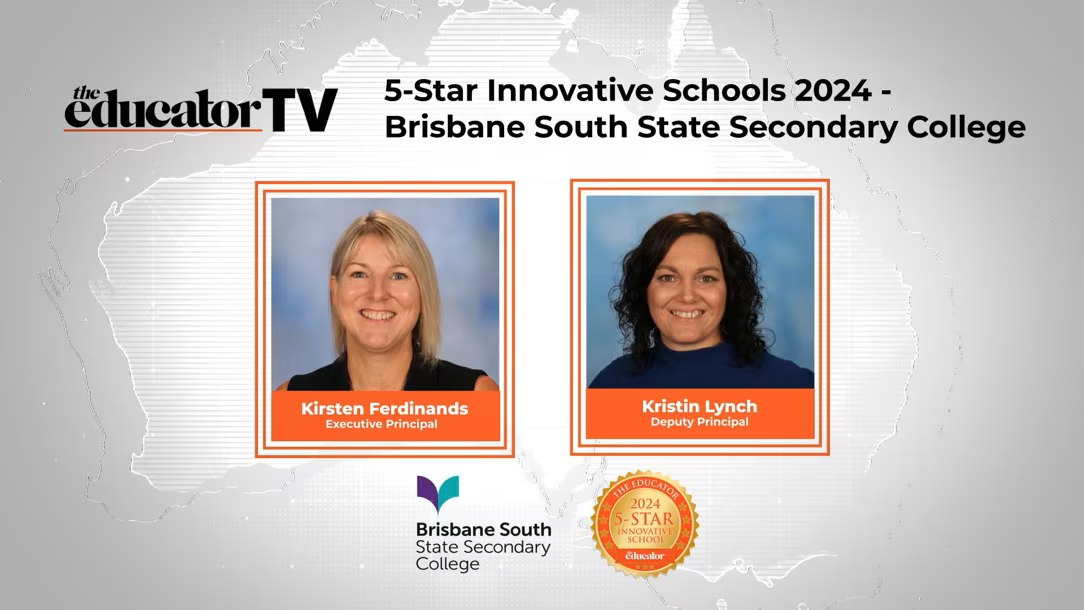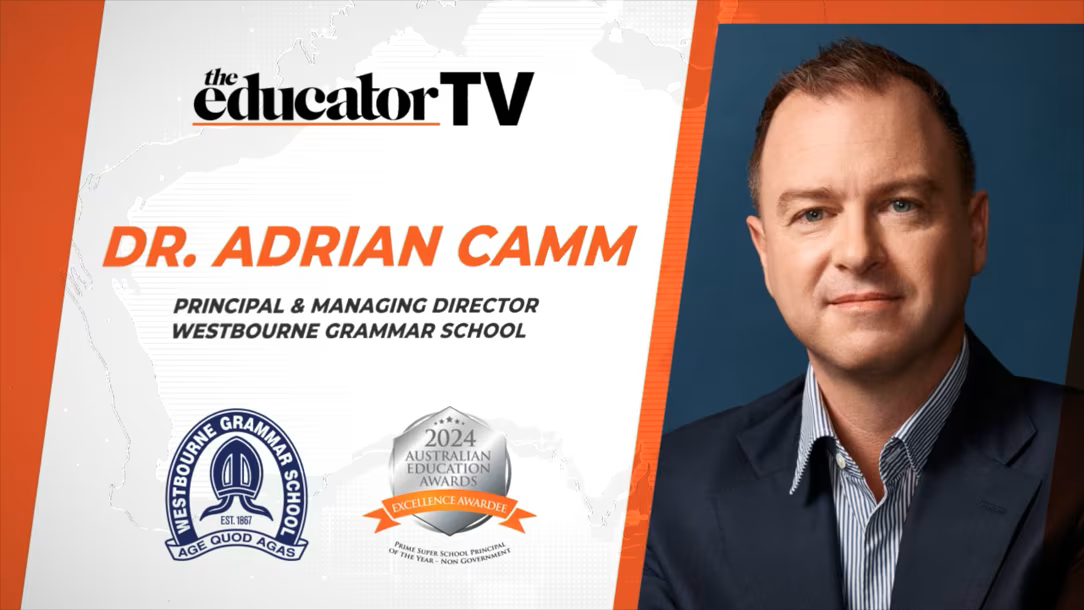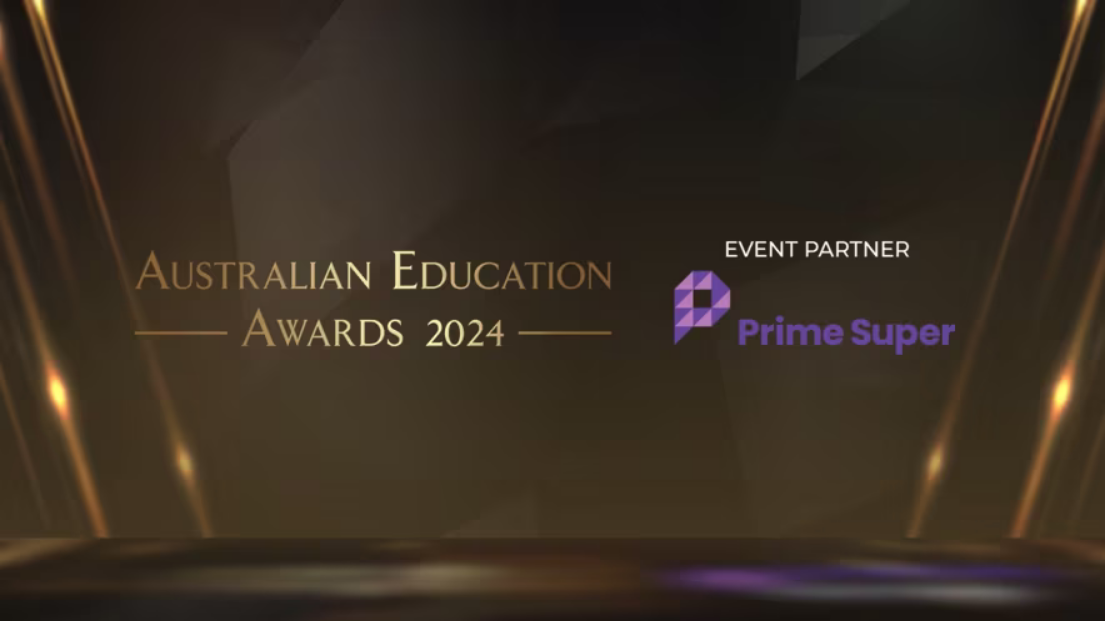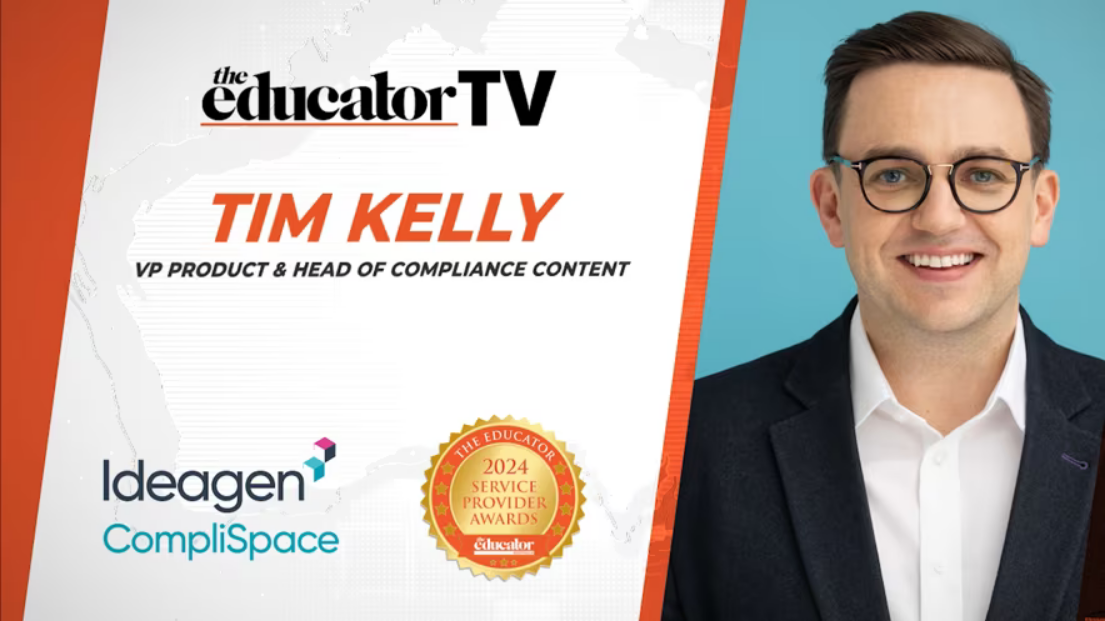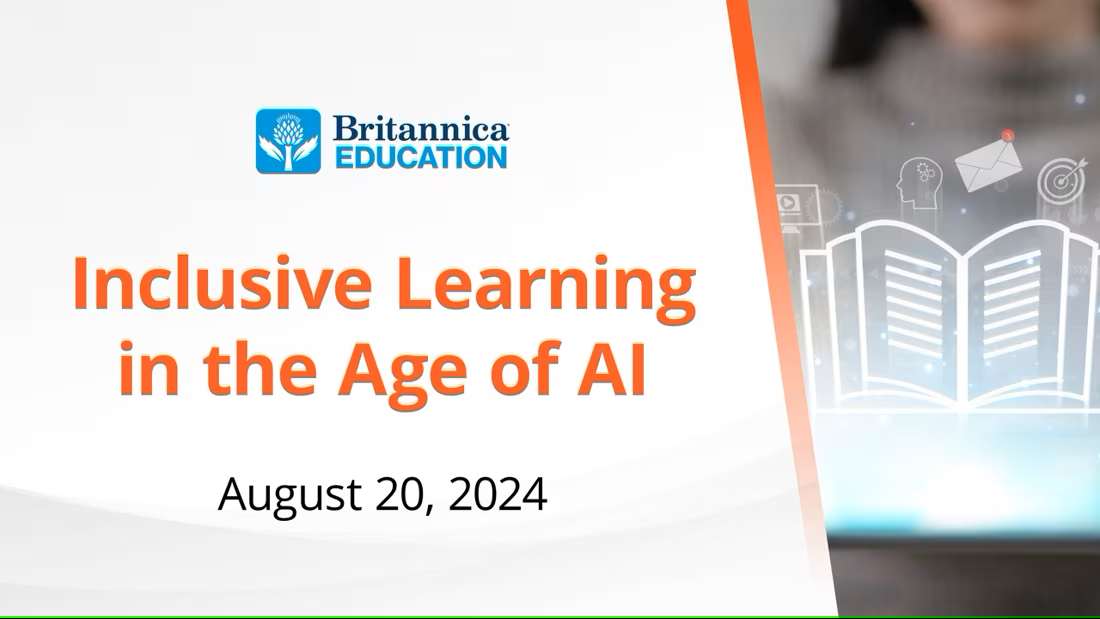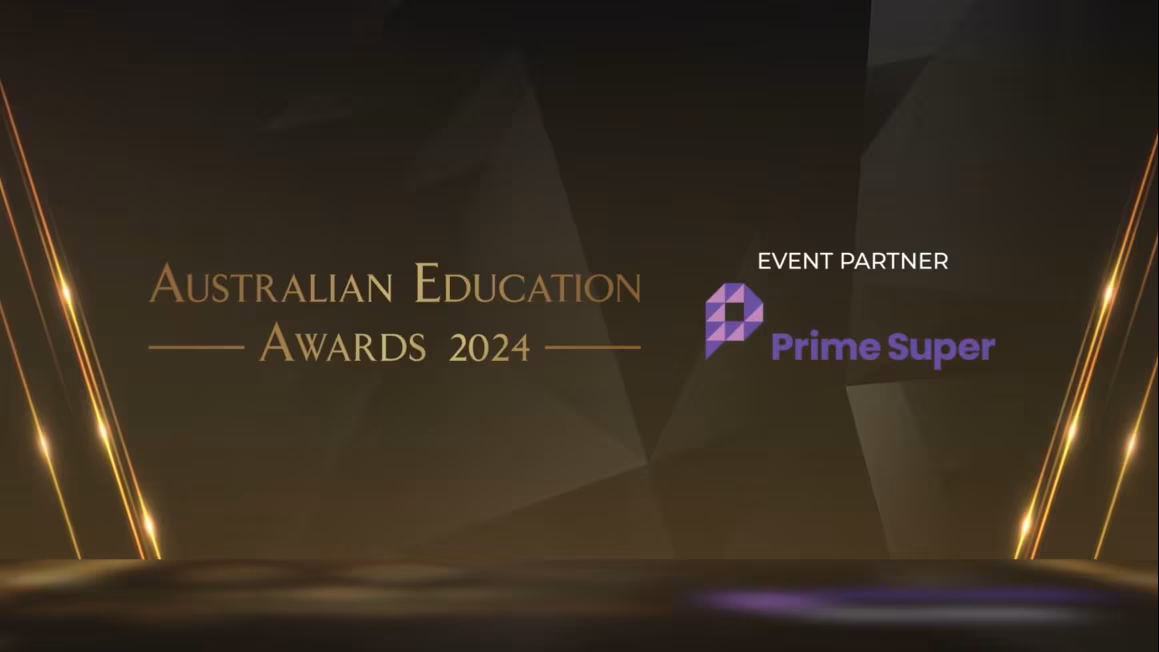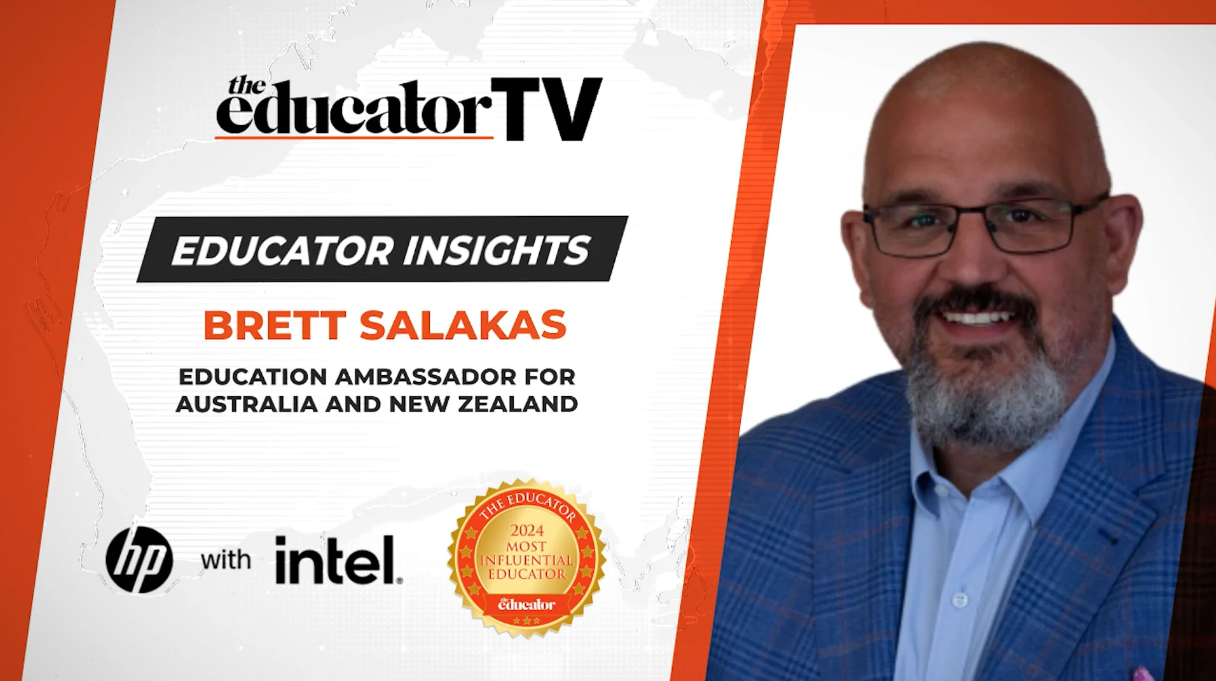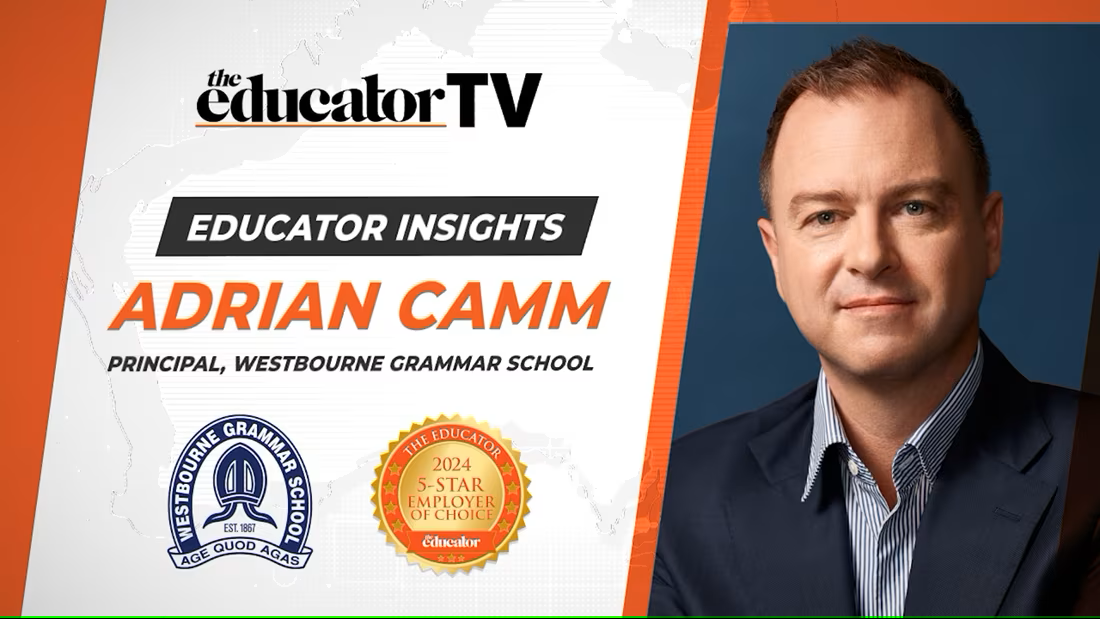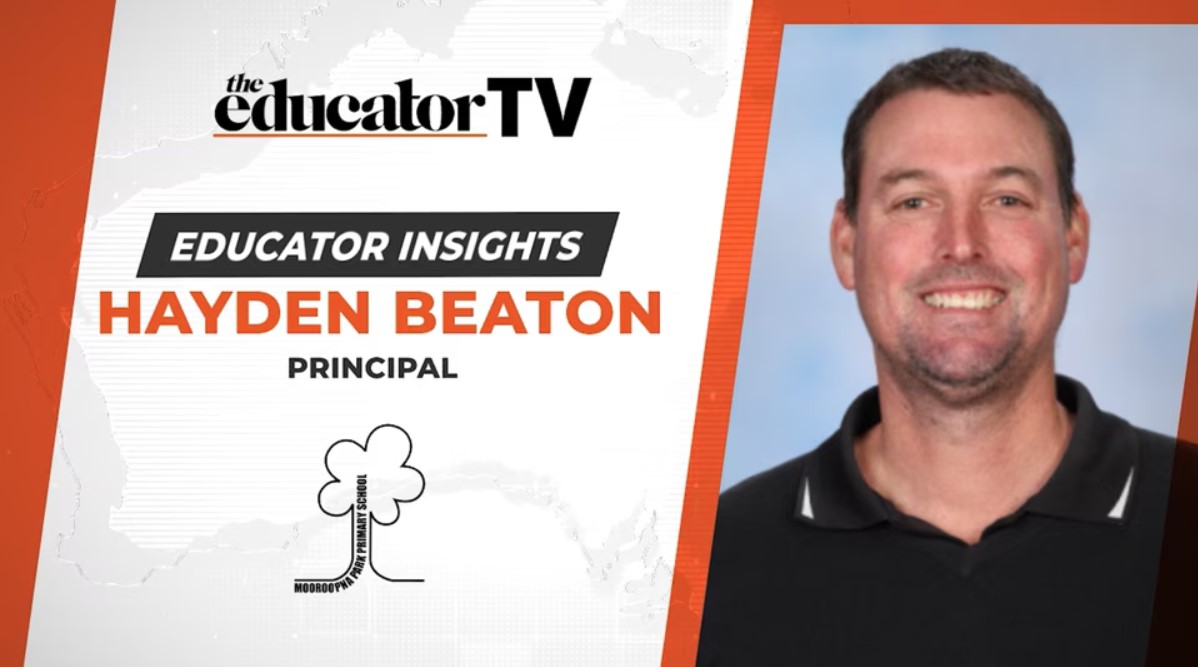VIDEO: Innovative teaching at its best
This interview explores Stewart’s commitment to student wellbeing, innovative teaching, and global citizenship.
To view full transcript, please click here
Kylie Speer 00:00:07 Hello and welcome to The Educator TV. I'm Kylie sphere. Thank you for joining us for Educator Insights, our inspirational education leadership series that takes a deep dive into the current state of education in Australia. Joining me today is Janet Stewart, Principal at Moreton Bay College. Janet dedicated eight years to teaching in the UK before embarking on a transformative journey to Australia. She joined Moreton Bay College in 1997. And her commitment to educational leadership and exceptional skills led to her appointment as the principal in 2017, where she continues to shape the future of the institution. Welcome to you, Janet. It's wonderful to have you on the show.
Janet Stewart 00:00:56 Thanks very much, Kylie. I'm so excited to be able to have this opportunity to talk with you.
Kylie Speer 00:01:02 Well, firstly, Janet, can you tell us a little more about Moreton Bay College, your educational offering and how many students the college educates?
Janet Stewart 00:01:12 Look, so Moreton Bay College excitingly, this year is 122 years old. It was founded in 1901 by three, I think, must have been formidable sisters, Alice, Anne, and Helah. And they were keen to establish an educational environment where women could be nurtured holistically where they would have an opportunity to, you know, grow in terms of their knowledge and learning, but also grew as people. And I think, you know, they were probably very ahead of their time. And that sort of thinking way back at the turn of the century. And so, you know, they really set out to establish an educational environment where young girls could focus on that academics, but also look at those things that make us a whole person. So also, you know, exposing them to sport. And the girls did Eurythmics in those early days and went swimming donut went and waterfront at the open air pool, and, and then exposing them to art and the cultural pursuits. And that's something that was really important to the greens, they were intrepid travelers themselves, they visited Europe, they brought back many pieces of art with them, and we're blessed to have some of them around our school today. And, and one of the sisters and she was a really accomplished artist. And so we have some of her pieces, you know, hanging in our Founders Room and in various places around the school. So it's, it's been an environment for your girls have been nurtured holistically for 122 years, and it's been about ensuring that, you know, in a safe, and you know, sort of faith driven environment, that girls really get the opportunity to fulfill their potential. Because at the end of the day, what we all want are young women who leave here, they're courageous, they're confident, they're competent, and they feel that they are ready to take on the world, whatever that might look like for them as individuals and then affect, you know, real change and improvement in the communities in which they then choose to live. So it's, it's, I think, in terms of its philosophy, and its history, it's been an exciting environment to grow in as a teacher, first of all, when I joined and then as a leader. And so that commitment to get all this education has been really a driving force for me over the sort of last 26 years, I've been connected to the school. And now, you know, after, you know, these 122 years, we're educating almost 13,000 Girls, and all the way from the early years and kindergarten through to Year 12. And we also have an Early Learning Center, where we there's a co educational offering there and we support and, and nurture around 80 Young Learners in that environment. So there's real breadth of offerings. There's real diversity then, in the sort of relationships that can be formed here at Moreton Bay College, because we can truly, you know, be with a family and journey with them from the moment they step into early years, all the way through to Year 12. And we have a wonderful tradition on founder Steve which is the green sisterhood and that acknowledges our founders, the greens, but also acknowledges those girls and their families who have stayed with us from for the complete Moreton Bay College education. And so it's, it is an exciting environment to be part of and I think we're also blessed to have a very strong relationship with our brother school that was founded in 2003. So we're unashamedly single sex and we ensure that we tailor you know, all of our decision and all of our policies and our philosophy to the best for the girls in our care. But it's also about having that responsibility to ensure that they can connect and socialize comfortably with, you know, the male of the species. And so having that wonderful relationship with Moreton Bay boys college really allows us to do that. So we're single sex, but I like to say to parents, that we offer them the best of both worlds, because we have those wonderful connections with the boys college. And we have lots of opportunities in the co curricular space, in music, and in some sports like sailing where the boys and girls actually are involved in the program together. And then instead of that senior level of education, we offer the Diploma of Business and we offer then some extension subjects, to boys and girls, such as music and English extension, the boys and girls can come together to do that. And that offers, then our students and the boys, a broader suite of subjects as well. So it is, it's a wonderful environment. And it's also, I think, a very exciting time to be leading the school because it is an exciting time in education.
Kylie Speer 00:06:14 That's such an incredible history. Janet, in your role, and career as principal, what is it that you're most passionate about?
Janet Stewart 00:06:25 I think it's always been about making sure that any students in my care, feel safe, they feel happy and connected. You know, when I started as a young teacher, one of my mentors at Glasgow Academy said to me, that, you know, it was boys at that time I was teaching and he said, you know, the boys here, Janet, don't care how much you know, until they know how much you care. And I think that's what's underpinned my philosophy of education, that if I can demonstrate to a student, that I care that I value them that I see them as an individual, I know them as an individual, then hopefully, they feel safe in the environment in which they are learning. And then they'll explore. They'll take risks, they'll be curious, there'll be open to asking questions and wondering, within your classroom environment. And so you can take students on a journey. So for me, ensuring that you nurtured and fostered an environment where young boys at the time, but then young women know, feel safe, happy and connected, then I think they can achieve anything, anything that's possible. So my driving passion has always been wellbeing. It's, it's been something I think that right from those early days in my career, I realized was fundamentally important. You know, if you feel well, you function well. And I think then you achieve will, that alongside of that, be it academically, be it in sport, be it in music and drama, speech, whatever it may be, I think it's at the core. If you are that safe and secure, and connected individual, then you've got the sort of foundations of success. And so, you know, as a deputy here, and then as as a principal, in the early days, I worked to develop a rune Wellbeing Framework, and it was called the hearts and minds framework. And it was based on the five ways to Wellbeing Framework that came out of the New Economics and Economics Foundation some years ago. And we develop that. And we've really embedded it into the culture here at Moreton Bay, not just in the, the taught curriculum or our pastoral programs. But also I think, in your courts, curriculum, your culture, that's the language we use, it's how we interact with one another. We're a restorative practice school. So it is about, you know, building relationships founded on trust and being open to resolving any conflicts that might happen and finding ways to always move forward. So we've developed that over the last seven years. And I'm really excited that in the last year or so we've kept that strategic focus moving forward and our new strategic plan, and we've been able to reimagine that will be in framework because I think it's so fundamentally important. And I think what we've been able to do as a leadership team is shift that perception of well being as an individual responsibility to something that's actually a collective responsibility, we have to change things that are a systems level, if we're really going to affect the well being of all within our community. So it's that's been my driving passion for you know, I think as long as I've been in the classroom, and it will continue to be and I think, in the climate we live in when you know, young people's mental health and well being is so fundamentally important, I think we have to that that has to be the bedrock on which we build all of the other programs. And it was lovely last week to hear their year twelves, departing speeches, all of them spoke to that culture of care, all of them spoke to being known to being valued to being, you know, seen. And I think that's what we want. Because all of the research tells us that if young people feel that and have that sense of belonging and connection, then that allows them to continue to explore who they are and, and unexplored, you know, new and exciting opportunities that ultimately help fellow them to fulfill their potential, and we say here be the best version of themselves.
Kylie Speer 00:10:45 What a beautiful philosophy. Janet, the education landscape in Australia is transforming rapidly, can you talk us through the changes you're most affected by and how you're approaching their adoption?
Janet Stewart 00:10:59 I think obviously, there's a few key areas here that you know, really as a as a leadership's team that we've looked at. And obviously, the digital transformation, I think, is at the forefront. COVID, I think, you know, brought with it some real challenges, but also some real opportunities. And I think what we've tried to do is harness some of those here that Moreton Bay and so we have adopted probably, you know, a more open minded approach to embracing some new technologies, and, and really focusing on some of those online learning tools that, you know, really we know, enhance the experience for our students and for the educators. So, you know, our girls are very comfortable, know, you know, working through one note and collaborating through, you know, a teams and through Padlets, and Kahoots all sorts of different digital tools. And I think that's exciting. But of course, I think along with that comes, I think I need for us to be more flexible in our learning models as well. I think that's another great challenge that that we have right now. And I think what's exciting, I think about that is seeing the opportunities when it comes to perhaps offering meet individuals different approaches to their learning, you know, being able to offer some maybe hybrid models of learning at different times and their learning journey for various different reasons. But I think that's been something we've been sort of very open to, I think the other thing that struck me in the last sort of 10 years here in Australia is that there's been a real shift from, you know, that focus on learning what you needed to know, to learning about how you go about learning, it's the how of learning that's become really fascinating to us, and all of the brain research and, you know, all of the work that you can read around this area really has helped us I think, understand, you know, young people and how they're learning right now and and what the, what skills they need to be able to be successful. And in recent times, we've developed our own teaching and learning approach. And so we had an IB school in the primary school, we offer the International Baccalaureate primary years program. And secondary, obviously, we're focused on the Australian Curriculum and seven to 10. And preparation then for the Queensland Certificate of Education and underneath our results for some girls on a vocational pathway for others. So for us, there was a challenge about four key skills, key attitudes and attributes, really, were at the core of how we learn to allow our girls to be ready for you know, the future and whatever that may look like. So we've we've developed this learning framework, which, you know, we have at the heart of it, that we want girls to be curious. We want them to be able to collaborate, we want them to be agile, and you know, that's obviously something but COVID taught us all, we also want them to have agency, that idea of young women in this world having voice and having choice and having ownership of not just the learning, but every aspect of the life is fundamentally important to us. And the other key skill that we want girls to learn is really reflection, how do they take time to learn more about themselves and the learning processes and so, you know, trying to set up some genuine reflective moments in their, you know, sort of learning journeys. So, for us, that's that's how we've tried to respond to that focused on a sort of skill based education, you know, not necessarily just that knowledge based education. And I think the other big one that we're all grappling with is is globalization. You know, we live in a very global world and I think, you know, as a leadership team team, we've sort of we've focused a lot on thinking about this strategically. And, you know, again, during COVID, you know, it became obvious to us that we, you know, we wanted to pause COVID Move away from that sort of very insular, parochial sort of experience that sometimes girls had, during that time to opening their minds up again, to a much bigger world and, and greater perspectives on the world. And so we've we've devoted considerable time to developing a global citizenship charter this year. And the exciting thing is, we've done that with our whole community aware that we've got a community that does travel for business travel for pleasure, that we've got a global community here at Moreton Bay, we've got very diverse families, we've got a sort of burgeoning international program, as well. And so we want to embrace that diversity and embrace the different cultures that are within our own community. And so we've worked with our staff, with our students with their parents to create the charter. And we've just been rolling it out over the last week at various speech nights and celebrations of learning, talking from our, to our youngest students all the way in the early years, and trying to help them understand what it means to be a global citizen, all the way through to, you know, obviously a year twelves. And, and so that's, that's been a real commitment for us, because we do want to bring in that sense of globalization alive in all of our classrooms. And we really want to work with the staff to embrace that diversity and to foster that inclusion. That's, that's so much part of globalization as well. So I think those are the sort of three key areas that I think have been a challenge in recent times.
Kylie Speer 00:16:53 As you've already touched on, Janet, health and well being and diversity and inclusion practices have, thankfully never been as top of mind and vital as they are right now. Can you share a little more about how the college approaches this area with your staff and students?
Janet Stewart 00:17:12 Absolutely. As I said, I fundamentally believe that if if wellbeing is at the heart of what you do, and it's at the heart of your decision making, then you're going to get really good outcomes for everyone who's involved in your community. And so, I think over over time, we've approached wellbeing at Morton B as as something that is just woven into the fabric of what we do. And it's to be honest, Kaylee, one of the reasons why I think I've stayed at Moreton Bay College for so long. I mean, pastoral care was important in my previous roles, and the social and emotional well, being of the students was always paramount. But when I got to Morton B, it was probably the first school that I felt, they actually walked the talk, when it came to pastoral care that they spoke about it and they actually lived it every single day. And that's what drew me to this skill that drew me to this community. And so, I think, you know, what we ensured we try to ensure every single day is that everything about wellbeing is sort of intrinsically linked to a broader school systems. And so we've got a very structured as I said, you know, pastoral curriculum that runs all the way from the early years through to Year 12. But for us, it's it's also about it being a responsibility of the collective of, of the way we all interact with one another. And we, we, you know, have worked very closely with parents in recent years to understand from them what they would like in this space to and we've had, you know, a number of wonderful presentations from people like Justin Coulson and Judith Locke, people like, Susan, sorry, I've forgotten her name. No, no, that's awful. She does a lot of work in anti bullying, and all of those people to help us and help our parents understand something of their children's, you know, pressures right now and the stresses that's on them, and I think, an understanding particularly of the digital world, I think that's a space where, you know, we have young minds who are not, you know, sort of mature enough to sometimes deal with some of the issues and some of the sort of things that they confront online and we want we see it as part of their responsibility, of course, to be your nurturing really strong and discerning digital citizens. So it's in those spaces we really try to affect some change. For for our parents protect feel it and educate them so that we're all working together to support these, these young people that school and, and sort of home Family Partnership is so fundamentally important, if we are to ensure that we are creating, you know, happy and connected young people, because if they're connected, the chances of them disengaging from school go down. And therefore, you know, we can hopefully ensure that that in this safe environment we're learning for, for for them is a priority and, and that the language we use around that is that it's wellbeing for learning. That's what we want for these young people that if they're well, you know, they'll learn.
Kylie Speer 00:20:42 Janet the subject of artificial intelligence is an increasingly complex one. What are your thoughts on how to best work with this technology going forward?
Janet Stewart 00:20:52 Oh, I think, you know, like every school in Australia, this time last year, you know, we were, you know, all of our discussions were around AI, it was around ChatGPT it was, what are we going to do? What's next for us, then when it comes to academic integrity? You know, we had some big questions, and we spent some time over an oblique last year, trying to read as much as we could at that point about it, and also play with it, I spent a lot of time, you know, just sort of having some fun with ChatGPT. And I'm an English teacher of old Kiley. So I was keen to see what sort of essay it could give me on, you know, ambition, in Macbeth and things like that. So it was good to have that time, I think that breathing space before the students came back in January to, for us all to think about, you know, sort of, and experience something of this new phenomenon. And I know, it's not new, but it was, it was new, in terms of it was suddenly available, readily available to students. So the first thing we did then was we spent time with our staff and the sort of professional development days that we have in January and, and talk to them about it and ask them what they thought of it, you know, what they thought were the benefits of it, you know, where they were, had some concerns. And from that we collectively, then created a position statement, and the position statement, I think, you know, acknowledge that we wanted to use AI to empower their students, we wanted them to see it in a positive light, because it can enhance learning, you know, it's absolutely at the heart of, you know, a world of possibilities for, you know, these young people. But we also, of course, were concerned about this sort of ethical position around AI. And, and many of our teachers were worried about plagiarism, and, you know, people trying to pass off, you know, something that they had managed to download from ChatGPT as their own work. So, you know, a position statement, you know, tries to make a very strong ethical position. And so far as, you know, we obviously want to ensure that there is no plagiarism that there's, there's no bias when we're using it. But, you know, and young people become very discerning users of it, but also frame that in a positive light, we would be foolhardy. If we closed down I think, opportunities for this incredible digital tool. And, you know, we've over time, we've got an elearning coordinator, who's done sort of a regular survey of just checking in how teachers are using it themselves over the years. And, you know, they're using it for lesson planning, some are using it to create those mock cases on Macbeth and give it to a class and ask them to mark it against, you know, the criteria on which, you know, they're going to be judged as well. It's been a way to sort of test some error in programming codes, we've generated stimulus for performance tasks, it's so I think, teachers have enjoyed the exploration themselves. And I think because our girls have seen teachers do that, and teachers being very open and transparent about using, you know, AI, then they're not scared of it, and the hopefully learning how to manage it in a in a values driven way, in an ethical way, and a really positive and productive way. So, I think, you know, for us, it opens doors, it opens possibilities, and I think it's important that we then try to integrate it in ways that are positive into the curriculum for their students and, and allow them to feel that they are learning and growing and understanding in that ei space because it it will be their future. You know, we have no idea what sort of jobs will be available. I heard the other day that there's a new course that's been started that you can be a prompt in engineer, so someone who will then learn how to prompt your AI engine. And I think, you know, that's the world they're stepping into, we've got a responsibility to make sure that absolutely ready for it. So it's been an interesting journey, and an exciting journey, I think with AI.
Kylie Speer 00:25:18 And finally, Janet, what are your top recommendations or requests right now to affect positive change in education?
Janet Stewart 00:25:28 I think across all educational stages, it's, it's really important that when we're looking forward, we're looking about always creating an atmosphere where there's continuous improvement where there's lifelong learning. And I, I think we have to sort of go back to the Start almost calian. And, and we have to look at early here. So if I could, and it's not an area I'm trained in, but it's an area I'm absolutely fascinated by, because we've, in recent times, shifted the way we deal with it, and, and educate early year students from that idea of, you know, child care, to early learning, understanding the growth and potential in you know, sort of their youngest learners. And so there's been a real shift here that Morton B and I think across the country, and I think what we have to do is invest in those early years, and we've invested in terms of physical resources, we've just built an amazing new early years precinct where their early learning center or kindergarten and our trip, girls, and students are all together there. But it's also I think, investing in, you know, learning in terms of those youngest learners, actually, you know, come to grow and understand and see their world. And so I think, the focus on some good professional development for staff there and committing to that about plea, you know, what the research on planners is unequivocal, it's, it's very clear that the cognition that comes from Play is, you know, we can't possibly understand it. And you know, that the work that passes, Salzburg has done, I think, to promote that. And in Australian education coming out of the Scandinavian system, where it's so fundamentally important, I think, I think we need to invest in those early years, we really need to focus on that play based learning so that we can support that cognitive and social and emotional development in early childhood. And I think that's an investment in the future there. I also think another area that we we really need to invest in is Teacher wellbeing. You know, we can it all over media, there are discussions about the pressures and the some of the stresses that come with this role. And I do think, you know, that the role of teaching has changed over time. You know, and I think that the teacher that came in at eight o'clock and left at three o'clock and took no other responsibility, then long, long gone, I haven't met those teachers for years. But I think, as a community's despairs a little bit, the school has become, you know, some of the most important communities that that families experience. And so I think, the responsibility that brings with it for teachers is, is quite incredible, that they are not just educating them about maths and physics, and, you know, and, and, you know, French, they're also educating them about world, the world about, you know, sort of social and emotional issues, about digital citizenship, about AI, all of these things. So I think it is a huge job. But I want to make sure that young people who come into this profession, don't leave it, you know, the drift after five years is worrying the statistics around that tell us that we lose, you know, so many young people at the end of five years because of the pressures of the role. And that's something I think, as a profession, we've got a responsibility to change. And here we've developed over the last few years, so graduate and early career careers Teachers Program, and that's working really well. And, and really, we've relied on them to tell us a little bit of what they want a support in those early years in their career and helping them develop, you know, as proficient teachers. And hopefully, that's a small part and helping them stay within this, you know, wonderful, wonderful profession. And so I think we, we have to ensure that there is a focus on teacher wellbeing, be it not just here but across the profession. And the other thing I think that we should be focusing on moving forward is that That partnership with parents, you know, parental involvement for me is so fundamentally important. You know, you get to meet families, on the sidelines at sports or at a music concert. And they all want to be engaged in their young person's, you know, sort of education, they want to support us, they want to understand more about what's happening in the classroom. And I think there's a wealth of experience and knowledge across their parent body as well, that we should be tapping into, we should be really making the most of their professional and industry, industry experience all of that. So I think if we can really nurture and build and strengthen those connections between the school and home, then we creates what I think is a safety net for young people and a hopefully a very nurturing environment for young people to feel that they've got the conditions around them to just thrive and flourish and be the best they can be.
Kylie Speer 00:31:01 Fabulous advice. Well, thank you very much, once again, for your time today, Janet, and it was so lovely speaking with you.
Janet Stewart 00:31:09 Thank you so much, Kylie, it's it's always a delight to be able to talk about a profession that you love so much, and a school that you're passionate about. So I'm really blessed to work here and to be part of, I think, such an incredible team that have young people, their learning and their well being right at the heart of everything they do.
Kylie Speer 00:31:31 And thank you, of course, to our viewers for watching the latest episode of Educator Insights. We look forward to seeing you again soon.



